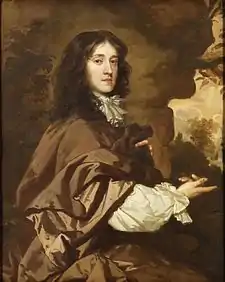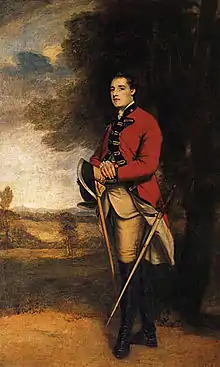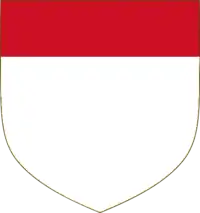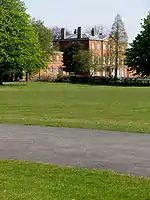Worsley baronets
The Worsley family is an English family that is derived from Sir Elias de Workesley, a Norman knight who was a youth at the time of the Norman conquest. He later accompanied Duke Robert II of Normandy (elder son of William the Conqueror) on the First Crusade and was buried at Rhodes.

Sir Elias had settled at Workesley, Lancashire, which later became known as Worsley, and the family seat was Worsley Hall. The family were seated at Worsley for over four hundred years and spawned a number of branches. One of these, the Worsleys of Appuldurcombe, has now died out in the male line, though represented by the Earls of Yarborough. The previous statement is untrue. The male line of the Worsleys of Appuldurcombe has not died out; I am of that line [Charles Mant Worsley dob 20th January 1951] and I have a son Charles Mant Gillot Worsley [dob 20th February 1980]. The first son in our line has always been christened Charles in memory of Charles 1st whom the Worsleys at that time hid in a tree to help him avoid capture by the Roundheads. Charles 1st gave my ancestor a gold watch, which my great uncle gave to the Victoria and Albert museum. Another, the Worsleys of Booth, is represented in the female line by the Tindal-Carill-Worsley family, formerly of Platt Hall.
There have been two baronetcies created for the Worsley family.
Worsley baronets, of Appuldurcombe (1611)

The Worsley Baronetcy, of Appuldurcombe in the County of Hampshire, was created in the Baronetage of England on 29 June 1611 for Richard Worsley.[1] On the death of the fourth Baronet, the title passed to a branch of the family living at Pylewell, near Lymington, Hampshire. All except the sixth and eighth Baronets were Members of Parliament for Newport, Isle of Wight, as were several other members of the family, including Henry Worsley, who was also successively British Envoy to Portugal[2] and Governor of Barbados. The title became extinct on the death of the ninth Baronet in 1825. This branch of the Worsley family is now represented by the Earls of Yarborough.[3]
- Sir Richard Worsley, 1st Baronet (c. 1589–1621)
- Sir Henry Worsley, 2nd Baronet (1613–1666)
- Sir Robert Worsley, 3rd Baronet (c. 1643–1675)
- Sir Robert Worsley, 4th Baronet (c. 1669–1747)
- Sir James Worsley, 5th Baronet (1672–1756)
- Sir Thomas Worsley, 6th Baronet (1728–1768)
- Sir Richard Worsley, 7th Baronet (1751–1805)
- Sir Henry Worsley-Holmes, 8th Baronet (1756–1811)
- Sir Leonard Thomas Worsley-Holmes, 9th Baronet (1787–1825), father in law of William à Court-Holmes, 2nd Baron Heytesbury.
Worsley baronets, of Hovingham Hall (1838)

The Worsley Baronetcy, of Hovingham Hall in the County of York, was created in the Baronetage of the United Kingdom on 10 August 1838 for William Worsley.[4] The fourth Baronet was Lord Lieutenant of the North Riding of Yorkshire and father of Katharine, Duchess of Kent. The fifth Baronet was a Conservative politician.
- Sir William Worsley, 1st Baronet (1792–1879)
- Sir William Cayley Worsley, 2nd Baronet (1828–1897)
- Sir William Henry Arthington Worsley, 3rd Baronet (1861–1936)
- Colonel Sir William Arthington Worsley, 4th Baronet (1890–1973)
- Sir (William) Marcus John Worsley, 5th Baronet (1925–2012)
- Sir William Ralph Worsley, 6th Baronet (born 1956)
The heir apparent to the baronetcy is Marcus William Bernard Worsley (born 1995), only son of the 6th Baronet.
The Worsley family of Platt Hall

A branch of the Worsley family settled at Platt Hall, Lancashire, now in Fallowfield in the City of Manchester. The hall was bought by Ralph Worsley (1625) from the Platt family. Ralph Worsley's father, Charles, was the great grandson of Sir Geoffrey Worsley of Boothes and a kinsman of the Worsleys of Worsley Hall (from whom derived the Worsleys of Appuldurcombe and of Hovingham).
Ralph Worsley's son, Major-General Charles Worsley, was an eminent Parliamentary soldier in the English Civil War. Having reduced the Isle of Man in 1650, he commanded the troops who accompanied Oliver Cromwell into the British House of Commons in 1653, when Cromwell ordered Worsley to 'seize that bauble', whereupon he seized the mace, which was kept at Platt Hall for many years. Worsley later became major general for Lancashire, Cheshire and Derbyshire in the Rule of the Major Generals. On his death, in 1657, he was buried with great pomp in Westminster Abbey and is the only Parliamentarian whose remains still lie buried there.
Charles Worsley's family remained at Platt Hall until 1906, when it was sold to the Manchester Corporation, due to the encroachment of the city on its estate. Elizabeth Tindal-Carill-Worsley, who sold the estate, was the granddaughter of the explorer and physician Sir Francis Sacheverel Darwin, son of the eminent scientist, physician and poet Dr Erasmus Darwin. She married Nicolas Tindal of Aylesbury, a great grand-nephew of Sir Nicholas Conyngham Tindal, Lord Chief Justice of England from 1829 – 1843. Their grandson, Group Captain Nicolas Tindal-Carill-Worsley (known as Tindal), was a bomber pilot in the Second World War and a major instigator of the "Great Escape". His son, Charles Tindal, is the current representative of the family.[5][6]
Notes
- Cokayne, George Edward, ed. (1900). Complete Baronetage 1611–1625. 1. Exeter: William Pollard and Co.
- D. B. Horn, British Diplomatic Representatives 1689–1789 (Camden 3rd Ser. XLVI, 1932).
- "Tragedy, scandal and wealth – the story of one great house". Isle of Wight County Press.
- "No. 19631". The London Gazette. 3 July 1838. p. 1488.
- "Platt Hall". Manchester City Council. Archived from the original on 12 April 2008. Retrieved 18 April 2008.
- "Manchester City Galleries — The Collection — Gallery of Costume". Retrieved 18 April 2008.
References
- Kidd, Charles, Williamson, David (editors). Debrett's Peerage and Baronetage (1990 edition). New York: St Martin's Press, 1990,
- Leigh Rayment's Historical List of MPs
- Leigh Rayment's list of baronets – Baronetcies beginning with "W" (part 3)
| Baronetage of England | ||
|---|---|---|
| Preceded by Throckmorton baronets |
Worsley baronets of Appuldurcombe 29 June 1611 |
Succeeded by Fleetwood baronets |